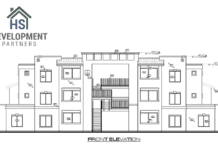The Sedona City Council unanimously approved amendments to the city’s short-term rental ordinance on March 25 after a first reading of the proposals on March 11.
The amendments are part of plans “to make it less desirable to own a short-term rental” in Sedona, as Councilman Derek Pfaff proposed on Dec. 12.
According to the council’s March 11 packet, there were 1,211 “identified STRs within city limits” as of December 31, 2024, representing a 6.4% increase from 1,138 in December 2018.
Units
The first of the proposed amendments altered the language of City Code to require permits for “each short-term rental unit” rather than a “short-term rental,” meaning a separate permit for each unit on a property instead of one permit for the property, while also adding language that “booking for rent, or hosting of guests” at an unpermitted STR is prohibited, duplicating existing language in the paragraph that prohibits “offering for rent.”
“It gives us a little more latitude that if someone is renting without a permit, or advertising without a permit and renting without a permit, that expands the opportunity for a citation,” short-term rental specialist Teresah Arthur said.
Expiration Date
Another amendment specified that “renewed permits shall be valid one year from the expiration date of the previous permit” to give permit holders what Arthur said is “the full length of their permit.”
“Someone who renews late, when they renew, their new permit will start retroactively to the expiration date of the previous permit,” Arthur said. “It’s a form of encouragement for people to renew on time.”
“The likelihood of someone not advertising for six months and my not catching it is really small,” Arthur said.
While a late renewal of a permit retroactive to the expiration date would normally have the effect of eliminating any citations or fines for operation of an STR during the late renewal period, the ordinance update explicitly stated that late renewals would still be subject to penalties.
No Transferability
The ordinance previously stated that STR permits were nontransferable, but the update added additional language reiterating that “a new permit is required if the ownership of a business, trust, corporation or company owning a short-term rental changes,” and adding language that “sale of a short-term rental property requires the selling owner to take down all short-term rental advertisements at the time of sale.”
“The language I wanted amended was to require the owner to take down their listings before the new owner starts short-term renting,” Arthur said. “Under the current ordinance, if you assume someone else’s listings before you have your permit, you’re adver tising without a permit, so I have been refusing to a new permit application until the former owner takes their list ings down … I would like to see that more formally laid out.”
“What happens when an owner of a property chooses to sell, and they have booked all these rentals six months in advance, and people have paid?” Vice Mayor Holli Ploog asked.
“I think the seller and buyer can coordinate,” City Attorney Kurt Christianson said. “They can have the old one end on the same day the new one starts.”
“Owners can pause their listing,” Arthur said. “I’ve been willing to accept that as a workaround. What a pause listing does is it makes the page invisible for future bookings. So it preserves the ratings and reviews and it preserves the existing bookings.”
Advertising
Another of the amendments added a prohibition on advertising an STR unit as available for special events to the existing prohibition on using STRs for such events.
“There are two properties that I am aware of at this point in time that have been advertising for a couple of years,” Arthur said with regard to listings advertised as wedding venues.
ADUs
The final amendment stated that “an accessory dwelling unit, as defined in the Sedona Land Development Code, including any guesthouse or casita with a full kitchen, may not be used as a short-term rental unless the owner uses the property as the owner’s primary residence.”
“It’s just clarifying that there’s two categories of accessory units,” Christianson said. “One’s the new accessory dwelling units, starting Jan. 1, 2025, and that has the short-term rental restriction. If anyone builds an ADU beginning Sept. 14, 2024, or gets a certificate of occupancy after Sept. 14, 2024, that’s an ADU. Everything that received a certificate of occupancy before Sept. 14, 2024, is what the code called a ‘guest quarters.’ Council, as part of that change, removed ‘guest quarters’ from the code, so that definition’s not there anymore, but they’re grandfathered in. They’re a legal nonconforming use, which means they don’t have that restriction on short-term rentals.”
“So this change in that language … about accessory dwelling unit, is not going to change the way anybody currently operating is going to do business, correct?” Councilwoman Kathy Kinsella asked.
“Correct, assuming they’re legal in the first place,” Christianson said.
Arthur also said that she had not yet begun doing random checks on STR properties to see if they were performing background checks.
Comments
Dyanna Nichols of the Sedona Verde Valley Association of Realtors said during public comment that SVVAR’s new STR study found that STRs drive “over 3,000 jobs for local workers” and encouraged council to read the report: “Try to make time for it.”
“I know it does certainly make some of your blood boil,” Nichols added with regard to STRs. “I’m looking at somebody whose blood it makes boil right now.”
“I’m perfectly calm, thank you,” Mayor Scott Jablow said.
“We have the word ‘kitchenette’ in the definition of an ADU. What we’re being told is a guest quarters is still defined as an ADU. Therefore, this proposed amendment would in fact apply to all ADUs in Sedona,” Cameron Wylde said. “If council and staff intend for this amendment to only apply to newly-permitted ADUs, as I think they do, section G can’t remain as it’s currently written.” He suggested adding the Sept. 14 date to the section in question.
Kinsella asked Christianson if he could suggest language to resolve the conflicting definitions, and he reiterated that guest quarters would be grandfathered in, with the Sept. 14 date already being included in the LDC.
“I don’t share those concerns,” Christianson said. He also noted council could delete the phrase “including any guesthouse or casita with a full kitchen” to resolve any apparent contradiction.
“I’m not comfortable with this at this point,” Kinsella said. “I’d like to know what the remaining concern is now that it’s been addressed.”
“Delete ‘as defined in the Sedona Land Development Code, including any, blah-blah-blah,’ and then take the definition from the Land Development Code and copy it verbatim to this paragraph,” Pfaff suggested.
Councilman Pete Furman said the text did not address anything built prior to Jan. 1.
“It’s obvious they’re fine,” Christianson said of existing guest houses. “We got four emails, five emails? Five people were confused.”
“I think there’s a majority up here that wants additional clarification,” Councilman Brian Fultz said.
“I think it would be best to just bring it back on a consent agenda in two weeks,” Christianson said.
The ordinance was approved as a consent item at the council’s March 25 meeting with no further discussion by council or public, at which time section G had been rewritten to state that “an accessory dwelling unit [ADU] that is issued a certificate of occupancy on or after Sept. 14, 2024, shall not be used as a short-term rental unless the property owner’s primary residence is the primary structure on the same property as the ADU. Guest quarters issued a certificate of occupancy prior to Sept. 14, 2024 in compliance with all applicable requirements and that have not been modified without a required permit constitute a legal, nonconforming use, and may be used as a short-term rental regardless of whether the property owner uses the property as the owner’s primary residence. Guest quarters that have converted the kitchenette to a kitchen, or have been modified without a required permit, are an ADU and shall not be used as a short-term rental unless the property owner’s primary residence is the primary structure on the same property as the ADU.”





















